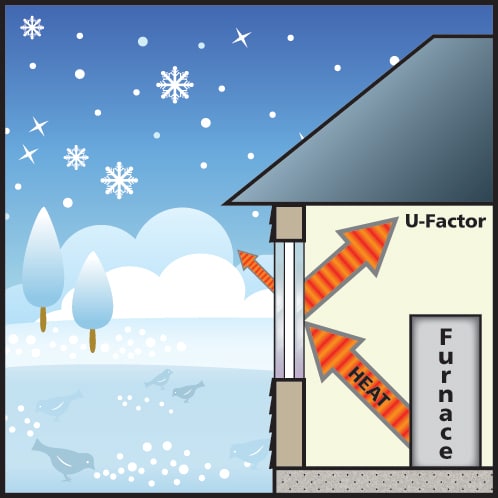


Technological advances in design and manufacturing processes have improved window performance dramatically in recent years. Today’s computing tools make measuring window performance more comprehensive and accurate than ever before. Measuring performance levels often means comparing a variety of industry ratings with which you might not be familiar. We thought you might like some more in-depth descriptions of these ratings and what makes a window more efficient than a similar window style or brand. So here is a little primer on industry jargon to help you understand ratings and why they matter.
Understanding U-Factor and Why it Matters

The lower the U-factor rating is for a window, skylight or door, the higher the energy-efficiency expectations. The U-factor rates non-solar heat transfer. As part of Renewal by Andersen’s commitment to offer the best replacement window products available on the market, we build in features and characteristics that control heat transfer.
Renewal by Andersen of New Jersey windows have many characteristics that ensure lower U-factor ratings.
Solar Heat Gain Coefficient (SHGC)
Another rating that really matters for New Jersey homeowners is the Solar Heat Gain Coefficient (SHGC). This is a rating that measures the amount of heat that enters a home from sunlight (solar radiation). Think about how hot your car gets on a sunny day (I know, we could all use a little of that heat now). What makes it so hot is all the solar radiation coming through the glass car windows. That solar energy also hits your home’s windows, which could make your house as hot as that car if you don’t have the right windows to help block and reflect that energy away.
The New Jersey climate varies greatly from season to season. We have frigid winter weather and hot, humid summers. There are three glass options in the Renewal by Andersen portfolio with excellent SHGC ratings; all work well in our climate, but each one has unique benefits depending on your personal environment.
Visible Transmission and Light-to Solar-Gain
Two more ratings you might want to consider are Visibility Transmission (VT) and Light-to-Solar-Gain (LSG).
VT ratings are between 0 and 1 and rate the amount of visible light that glass in windows, skylights and doors allows to enter your home. This rating is important if you want to gain better control of interior lighting or want to reduce glare. Higher VT equals more visible light.
Along with our glass options mentioned above, we also offer SmartSun™ glass without tinting. This options provides clarity features like regular glass, while only allowing 5% of harmful UV rays to enter your home. This means you have the benefits of natural sunlight and clarity without compromising your furniture and drapes.
LSG ratings are not always listed with efficiency ratings. This number represents a comparison between SHGC and VT, and identifies the performance of windows by measuring the amount of light transmitted against the amount of heat transfer.
Do you have more questions about how the U-factor and other replacement window ratings will affect your New Jersey replacement windows? Are you ready to schedule a home inspection to discuss the best glass options for your home. Fill in the form on this page and we’ll get right back to you, or, better yet, give us a call at (866) 609-5033.